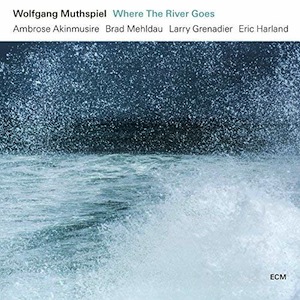Label: ECM Records, 2025
Personnel - Wolfgang Muthspiel: acoustic and electric guitars; Scott Colley: double bass; Brian Blade: drums.
Austrian guitarist and composer Wolfgang Muthspiel returns with his finely tuned trio—bassist Scott Colley and drummer Brian Blade—for their third ECM studio album. Tokyo features eight Muthspiel originals alongside covers of Keith Jarrett and Paul Motian, both presented with a redefined aura.
These covers bookend the album. Jarrett’s “Lisbon Stomp”, culled from the pianist’s 1967 debut Life Between the Exit Signs, opens with shades of bop, American blues, and gospel. Recast with modern bluesy chops, colorful intervals, and harmonic reinvention, it soon finds a swinging direction. Motian’s “Abacus” closes the set, loosely painted as an agile rumination steeped in lyrical abstraction.
Both renditions are emotionally honest and musically inspired, yet the real treasures lie in Muthspiel’s writing. “Paradela” glows in the dark as a resplendent rubato meditation, folding jazz and classical elements into a clear song form. Similarly, “Flight”—a piece in seven that layers arpeggiated passages, quick-witted chordal sequences, and smoky electric guitar lines—displays the guitarist’s emotive reach and the trio’s remarkable synergy. Colley’s breathing cadences and Blade’s enveloping cymbals add luminous depth.
The rhythm section provides both stability and suppleness, allowing Muthspiel to pursue an acoustic, chamber-like aesthetic free of unnecessary ornament. “Diminished and Augmented” feels like a complex, modern étude, its shifting passages and odd meter opening into improvisation, while “Weill You Wait”, a bittersweet waltz with ‘singing’ bass lines, reflects his admiration for Kurt Weill. Blade’s brushwork here radiates subtlety and refinement.
Unexpected turns also surface: “Roll” fuses rock ’n’ roll with bluegrass, while “Strumming” is a propulsive pop/rock-tinged jaunt in six, marked by gritty arco bass, bluesy bends, and resolute drive.
Tokyo finds Muthspiel, Colley, and Blade in top form—an elegant, deeply rewarding listen for the attentive and the casual ear alike.
Favorite Tracks:
02 - Paradela ► 06 - Diminished Augmented ► 08 - Strumming ► 09 - Weill You Wait










